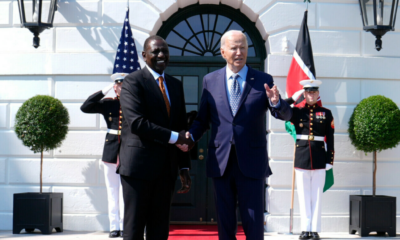Startups & Funding
Covid-19 Births First African To Manufacture USB cables
Anthony Muthungu, a precocious innovator has indelibly inked his name in the annals of Kenyan trailblazers

: From TotoSci Academy to Tech Innovation: How Kenyan Entrepreneur Muthungu Turned a USB Cable Shortage into a Thriving Business Post-COVID. Inspired by His Mobile STEAM School for Kids, Muthungu Now Leads Innovation with a Focus on Quality Electronics.
By Charles Wachira,
Anthony Muthungu, 32, has inadvertently and indelibly inked his name to the hallowed corridors of Kenya’s manufacturing terrain after becoming the first Kenyan to manufacture USB cables, disrupting aeon years of a monopolistic chokehold enjoyed by foreign firms in the sector.
This milestone by a vicenarian is understandable when it’s borne that Kenya bears the enviable moniker of being Africa’s “Silicon Savannah,” including being ranked eighth among 28 economies in Sub-Saharan Africa, according to the Global Innovation Index (2023) report with South Africa heading the pack.
In 2023 the most innovative African countries were Mauritius (52nd), South Africa (61st), Tunisia (71st) and Morocco (77th). These top four African countries kept their lead within the continent.
Compared to last year’s rankings, Mauritius was able to hold its position, while the others fell a few places in the ranking, with South Africa dropping from 60th place, Tunisia from 65th and Morocco from 75th.
The GII divides African nations into two main categories, Northern Africa/Western Asia and Sub-Saharan Africa.
The highlights for Northern Africa go to Egypt (94th) and Algeria (120th), which have improved their rankings.
“ In the Sub-Saharan region, Cape Verde climbed 14 places to reach 89th globally, becoming the fourth top innovator in its region. On the other hand, the GII authors also make clear that no countries have been able to constantly improve their ranking. Tanzania and Kenya have gradually improved but only over the past five years,” partially read the report.
Muthungu, a computer engineering degree holder from Zetech University – a local institution whose genesis also can be traced to a daring local entrepreneur– has become arguably the first African drawn from within the East and Central Africa region to manufacture USB cables – that from a quality point of view – can stand toe to toe with their imported peers.
To prove his burgeoning outlier pedigree this pathfinder was in 2019 feted as being one of the top 40 entrepreneurs in Kenya aged below 40 by the local Business Daily newspaper brand.
Two years later he was shortlisted for the Kenya-South Africa Chamber of Business award, a continental jamboree that shines the spotlight on entrepreneurial excellence.
According to the Association of Countrywide Innovation Hubs- a Kenyan focal point representing 17 counties out of a possible 47 whose objective is to support and build sustainable businesses and startups across Kenyan counties, Kenyan tech
start-ups topped the continent as they raised an impressive Ksh 21.4 Billion (US$ 177,593,359.14) of funding in 2023, underlining the alluring nature for local companies to thrive.
This level of funding is attributable to a socio-professional environment that is conducive to work notwithstanding Kenya’s unregulated start-up ecosystem.
Whereas countries like South Africa, Tunisia, Senegal, and Nigeria have pegged regulatory policies to govern start-ups, Kenya has no government policy that caters for the sector.
But in 2021 the country took baby steps towards reorganizing the sector by sponsoring a Start-Up Bill, 2021 which seeks to govern the interactions and relationships between start-ups, the government, investors, incubators and ultimately consumers.
“Efforts have been made to create an enabling environment for local innovation to thrive. For instance, through the Science, Technology and Innovation Act, 2013 the Kenya National Innovation Agency ( KeNIA) was established to coordinate innovation efforts in the country. Some include offering linkages to investors, creating and disseminating guidelines on commercialization, among other roles,” says George Masila, communications manager, at KeNIA.
Based in Kirinyaga County, a rural and agricultural rich enclave found in Central Kenya, 136-km South of Nairobi, Muthungu’s two-year-old TOTOSCI Holdings Limited, which produces
between 300 to 500 USB cables daily, owes its existence to an unlikely occurrence.
In 2020 after completing an undergrad degree he opted to pursue an entrepreneurial career rather than seek formal employment believing fortune favoured the brave and registered
TotoSci Academy – a mobile school that taught science, technology, engineering and arts to children aged between 4-17 years.
The name TotoSci is derived from two words -Toto stands for a child in the Kiswahili dialect, the highly spoken language within the East Africa region, while Sci is an abbreviation for Science.
And as is normal in the capricious world of entrepreneurship the school was shuttered after the global Covid-19 epidemic set foot in Kenya on 12 March 2020.
Housebound and with no work to do, his restless entrepreneurial spirit stirred him to design a ventilator. Then one day while transferring research data from his phone to a laptop he hit a snag.
“ At my house, I had six USB cables and none was working. I thought I was probably jinxed. But coincidentally I discovered my friends too were facing a similar challenge. I then opted to buy
their faulty cables at Ksh10 (US $ 0.083) per piece and within a fortnight I had 7,000 cables, which I dismantled hoping to discover what the problem was. What I discovered was the USBs were of low quality,” says Muthungu who initially wanted to become an army officer.
“ If you ask me why I wanted to join the army, I cannot tell you why. Even when I was already engaged in innovation, I tried three times before giving up in 2013, 2014 and 2015. In all of these competitions, running was a problem, because l was always among the last. In 2014, I placed 129 out of 142,” says Muthungu.
Meanwhile, as is routinely taught in business school, opportunities often creep in during crises as Muthungu discovered with the USB fiasco.
“I documented each of the 7,000 USB cables and I identified the problem and decided to fill the gap and decided to build something that is ten times better than what was already in the market,” says Muthungu.
Unfortunately, even though the USB cables have to date received approval from including the Kenya Bureau of Standards (KEBS), a 48-year-old government organization that ascertains local products comply with international standards and the Kenya Export Promotion and Branding Agency (KEPROBA), the Kenyan market is seemingly oblivious to the quality of the product.
“It’s probably a colonial mentality hangover where the locals think anything made in Kenya is inferior to imports while others think I should sell the item cheaply because it’s locally made,” says Muthungu who invested an estimated Ksh 3 million (US$ 24,916.94), monies he had been loaned by a friend to begin the company that relies heavily on social media to market itself.
A TotoSci-manufactured USB cable retails for between Ksh 135 (US $ 1.12) to Ksh 200 US 1.66), prices that compete favourably with imported contraptions found on the Kenyan street.
Currently, the company employs eight people directly – all engineers -with an additional 20 indirectly on the supply chain, says Muthungu who complains of a need to tame the high tax regime that defines the local market that disadvantages upstarts.
The machines he uses in the factory are imported from India and China.
Admitting that doing business is not for the faint-hearted, Muthungu says he’s into entrepreneurship for the long haul.
“I am a dyed-in-the-wool industrialist and even if I was making Ksh1(US$ 0.0083) profit per USB cable and I sold say to one million people, I would make a tidy profit of Ksh 1 million ( US$
8,305.65 ) and despite the inimical environment that is compounded by high taxation I know no situation is permanent.
This calling is not for everyone. When I sought to find if anyone in Africa was involved in manufacturing USB cables so that we could compare notes I pulled a blank,” says Muthungu.
By 2023 TOTOSCI Holdings Limited hopes to begin producing
mobile phone accessories with the end goal of eventually assembling
mobile phones by 2025.
Keywords: Kenya’s first USB cable manufacturer: Anthony Muthungu tech innovation: TOTOSCI Holdings USB production: Kenya’s Silicon Savannah innovation:Local manufacturing challenges in Kenya

Startups & Funding
Top 10 Richest East Africans Under 30: Industries & Net Worth

: Discover the top 10 wealthiest East Africans under 30, their industries,
achievements, and estimated net worths. Learn about their remarkable journeys
to success.”

Kenneth M. Njeru (25, Kenya)
- Engagement: Founder of Africa Afya Healthcare, focusing on healthcare investment services and IT solutions for healthcare access improvement.
- Industry: Healthtech and healthcare investment.
- Net Worth: Not publicly disclosed but prominent in healthcare financing in Kenya

Ayushi Chandaria (26, Kenya)
- Engagement: Founder of Design Thinking Program, fostering innovation in education.
- Industry: Education and innovation.
- Net Worth: Not publicly disclosed but recognized for her impactful work in Kenya

Alex Mativo (29, Kenya)
- Engagement: Co-founder of E-LAB, Nanasi, and Duck, leveraging technology in multiple sectors.
- Industry: Technology and entrepreneurship.
- Net Worth: Estimated at several million USD due to diversified ventures
- .

Prisca Wegesa Magori (29, Tanzania)
- Engagement: CEO and Co-founder of TenTen Explore and Smart EFD, providing innovative software solutions.
- Industry: Technology and software development.
- Net Worth: Undisclosed but influential in Tanzania’s tech scene

Andrew Ddembe (28, Uganda)
- Engagement: Co-founder and CEO of MobiKlinic, providing mobile-based healthcare solutions.
- Industry: Healthtech.
- Net Worth: Not disclosed but a key figure in Uganda’s health innovation

Arooj Sheikh (28, Kenya)
- Engagement: Founder and CEO of Beyond Kenyan Bars, working on social justice initiatives.
- Industry: Social entrepreneurship.
- Net Worth: Undisclosed, focusing on impactful social change
- .

Hildah Magaia (29, Tanzania/South Africa)
- Engagement: Professional footballer for Mazatlán FC and Tanzania’s national team.
- Industry: Sports.
- Net Worth: Significant from sports and endorsements

Chad Jones (28, Kenya/South Africa)
- Engagement: Social media influencer and brand ambassador.
- Industry: Digital media and marketing.
- Net Worth: Not disclosed but has significant brand partnerships
These individuals have demonstrated remarkable entrepreneurship and talent across East Africa, contributing to industries like health, technology, education, sports, and tourism.
-

 Politics5 months ago
Politics5 months agoFred Okengo Matiang’i vs. President William Ruto: A 2027 Election Showdown
-

 Business & Money10 months ago
Business & Money10 months agoEquity Group Announces Kshs 15.1 Billion Dividend Amid Strong Performance
-

 Politics4 months ago
Politics4 months agoIchung’wah Faces Mt. Kenya Backlash Over Gachagua Impeachment Support
-

 Politics6 months ago
Politics6 months agoPresident Ruto’s Bold Cabinet Dismissal Sparks Hope for Change
-

 Politics7 months ago
Politics7 months agoPresident Ruto’s Lavish Spending Amid Kenya’s Economic Struggles Sparks Outrage
-

 Politics6 months ago
Politics6 months agoJohn Mbadi Takes Over Kenya’s Treasury: Challenges Ahead
-

 Business & Money2 months ago
Business & Money2 months agoMeet Kariuki Ngari: Standard Chartered Bank’s new CEO of Africa. What’s Next?
-

 Politics7 months ago
Politics7 months agoKenya Grapples with Investor Confidence Crisis Amid Tax Protest Fallout










